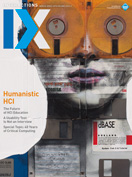Authors:
Deborah Tatar
As a professor, I now get to witness young people aspiring to "go west." They know the familiar trope "Go west, young man" ascribed to the 19th-century publisher Horace Greeley. They inherit the idea of manifest destiny, even when the term itself was buried in a single paragraph in their high-school American history textbooks. They have heard of the excitement of Silicon Valley, the freedom of San Francisco, and the repute of Stanford, and perhaps experienced the beauty of the Bay, with its dulcet breeze and sun that seems to transmit energy to young, healthy human animals directly through the skin. Seattle, Portland, Vancouver: a bit darker and wetter, but all romantic technology and design destinations, infused with makers, open source ideology, and the tragically hip. And then there is the far, far West—although neither Taiwan [1] nor Shenzhen [2] are really on my students' minds yet. Go west and seek your future!
Yet the advice to go west is also associated with a darker kind of idealism: a tall, thin, awkward young man in WWI England haltingly explaining his enlistment, saying that he will "go west"—that is, die—proudly if he must [3]. As Siegfried Sassoon wrote, witheringly from the trenches: "You'd think, to hear some people talk/That lads go West with sobs and curses/ ... But they've been taught the way to do it/ Like Christian soldiers; not with haste/ And shuddering groans; but passing through it/ With due regard for decent taste." (S. Sassoon, How to Die). In going west, what are my undergraduate students going into? Is it trench warfare or all "Googley" eyes?
Luckily for my conscience, my role does not much matter. It does not much matter what I say because these undergraduates already have a fixed image. And they are not the only ones. Indeed, I started writing this in chagrin after a recent conversation with my own mother. She was excited and shocked to report that she had learned that Steve Jobs was a Deeply Flawed Human Being. I tamped my reaction to this news down to the utterance, "This is not a surprise."
1. Bardzell, S. Utopias of participation: Design, criticality, and emancipation. Proc. of the 13th Participatory Design Conference: Short Papers, Industry Cases, Workshop Descriptions, Doctoral Consortium Papers, and Keynote Abstracts Vol. 2. ACM, New York, 2014, 189–190.
2. Lindtner, S., Greenspan, A., and Li, D. Designed in Shenzhen: Shanzhai manufacturing and maker entrepreneurs. Proc. of the 2015 Critical Alternatives 5th Decennial Aarhus Conference. 2015, 85–96.
3. Cambridge Idioms Dictionary, 2nd ed. S.v. "west"; http://idioms.thefreedictionary.com/west
Deborah Tatar is a professor of computer science and, by courtesy, psychology, at Virginia Tech. [email protected]
http://interactions.acm.org/blog/author/7252/Deborah Tatar
Copyright held by author
The Digital Library is published by the Association for Computing Machinery. Copyright © 2016 ACM, Inc.









Post Comment
No Comments Found